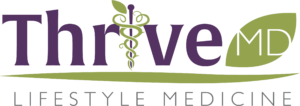Thrive MD Blog
Over the years at Thrive MD Las Cruces, I have helped patients with symptoms including abdominal pain, fatigue, headaches, auto-immune illness, endometriosis, abdominal bloating, joint pain, chronic constipation, chronic diarrhea, depression, anxiety, eczema, and psoriasis. Patients find me, or are referred to me, often when they find a dead-end to relief of their symptoms. They are looking for solutions to their symptoms that continue, despite the best efforts of modern medicine.
Research has shown that the digestive system, where we receive our daily hydration and nutrition, is frequently where our problems start. We often refer to the digestive system as the gut – meaning the pathway starting in the mouth, passing through the esophagus, stomach, and small and large intestines, and ending in the rectum. Please consider the following:
- 70% – 80% of our immune system is in our gut.
- The gut is our largest endocrine organ – hosting 30+ hormones and bioactive peptides.
- The gut is considered our second brain due to the nerves and neurotransmitters present in the gut and their connection to the brain.
Seeing these connections, it makes sense that changing what you eat, supplementing your body with nutrients it has been missing, and making additional lifestyle changes can help you feel better, and more control of your health.
My blog will highlight topics that can support you in your health journey.
As always, please feel free to reach out to me if you have questions regarding my practice or would like to schedule an appointment.
To sign up for my blog, please add your email here –
Detox
Every day, our bodies are exposed to toxins in the air and the environment. Chronic exposure to toxins and heavy metals has been linked to allergies, autoimmune illness, cancer, and respiratory illness. We can minimize exposure through lifestyle changes. Modifying your diet, using herbs and spices when cooking that support detoxification, and adding fruits and vegetables to your diet that are high in antioxidants. Improving your water intake, to help flush toxins from your body. Choosing cosmetic and cleaning products that are free of known toxins helps to minimize exposure. A good resource for environmental toxins is the Environmental Working Group. They have a great app – EWG Healthy Living.
Sugar
Processed sugar is a primary energy source for many people. High sugar intake can lead to alterations in your metabolism, can trigger inflammation, and lead to insulin resistance (meaning your blood sugar levels don’t lower as they should, when insulin is present). Sugar will disrupt the healthy bacteria in your gut and can increase harmful bacteria or fungi. Ultimately, a diet higher in sugar has been linked to increased weight, increased cancer risks and increased inflammation in the body. Reading labels, you can often find the hidden sugar in many products. I recommend the app Sugar Rush by Fooducate. This app allows you to scan barcodes and see how much sugar is in the packaged item.
Weight Loss
Looking to lose weight? Many diets will lead to weight loss but are typically not sustainable for long-term. Over the year, over many studies looking at weight loss, the results show that calories matter more than the composition of the foods you eat in a diet. Caloric needs can be calculated for individuals, but what makes those calories will ultimately influence your health. Foods can be high in calories and low in nutrients and vice-versa. Choosing foods high in nutrition are often lower in calories, and larger volumes of these foods can be eaten with overall calorie intake being down. Choosing these nutrient dense foods, which include natural foods that have not been processed and packaged, leaves the body feeling more satisfied, therefore taking away the need for more food.
Mindfulness
Mindfulness is the practice of focusing one’s attention on the present. You learn to acknowledge internal thoughts and external sensations in a non-judgmental way. It is a way to appreciate the transient nature of most sensations and learn to avoid becoming consumed by the thoughts and feelings that pass by. Practicing mindfulness in the kitchen, connects us with the cooking experience, helps us to be more aware of a meal’s ingredients, the portions that we eat, and the nutritional considerations. We learn to acknowledge how hungry of full we truly are, what sensations, thoughts, or feelings we have around the food we are eating, external cues that affect our dining experience, and emotional responses to eating, and how distractions affect the times when we are eating.
Hypertension
Hypertension occurs in 1 in 3 adults. It is more prevalent as we age, and stress can be a big component. What about diet? A study of looking at pre-hypertensive and stage 1 hypertensive adults compared a variety of diets to the effects on hypertension. The DASH diet, a diet which grew from the Mediterranean diet and includes whole foods showed a significant reduction in blood pressure allowing participants to control their blood pressure without medication. Food is our source of energy, but also our source of health. If you could modify your diet, and control your health would you make those dietary changes?
